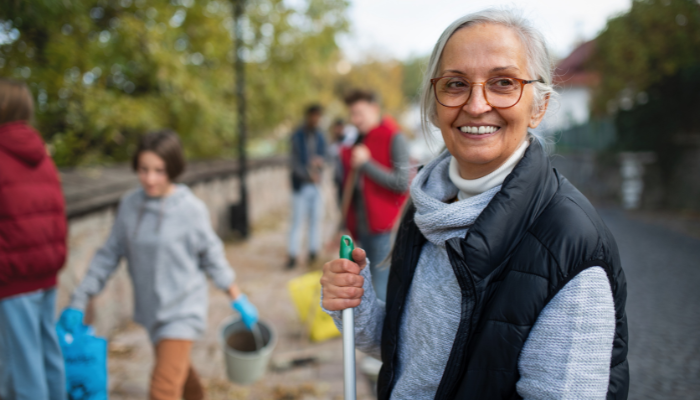When it comes to volunteering later in life, those who give also receive. Older adults who volunteer often experience better mental and physical health and greater life satisfaction than those who don’t.
Learn about the benefits and get tips on how to find a volunteer opportunity in this blog from The Bristal Assisted Living.
Physical and Mental Health Benefits of Volunteering
According to the U.S. Census Bureau, more than half of baby boomers volunteer informally, including activities like checking in on neighbors, tutoring children, or giving to those in need.
Health benefits associated with volunteering include lower mortality rates, greater functional abilities, and lower rates of depression. Experts believe those numbers are tied to the sense of purpose that being physically active and socially engaged gives volunteers.
According to research by the Corporation for National and Community Service (CNCS), volunteers with Senior Corps reported feeling less depressed and isolated than non-volunteers. Over 80 percent experienced improved or stable health after two years of volunteer service.
A study in the American Journal of Preventive Medicine shared that older adults who volunteered for at least 100 hours per year for four years (less than two hours a week) experienced the following:
- Increased physical activity
- Increased optimism and a stronger sense of purpose
- Reduced risk of physical functioning limitations
- Reduced risk of mortality
Related: 6 Ways to Help Older Adults Cope With Loneliness >>
Greater Life Satisfaction Among Seniors Who Volunteer
It isn’t only physical and mental health that get a boost from volunteering. Older adults also report higher rates of life satisfaction.
Volunteering positively impacts social and psychological factors. Senior volunteers often gain a renewed sense of purpose that they sometimes lose after the loss of a spouse or career.
Spending time with others on volunteer projects expands a person’s social network and keeps them from becoming isolated, helping to decrease stress and depression among seniors.
While depression is a barrier to volunteering in mid-life, it can be a catalyst for getting involved in later years.
Related: Benefits of Staying Socially Active + 5 Ideas to Build Relationships >>

Tips to Help Older Adults Find a Volunteer Opportunity
If you are a senior ready to donate your time and talent to help others, here are a few tips to connect you with a volunteer opportunity you will enjoy.
- Think about the issues important to you or the hobbies you enjoy. If you like reading and spending time with young children, helping with a reading program at a school or local community center makes sense. Working with the local animal shelter might be a good option if you love animals.
- Another idea is to find an opportunity that will give you the chance to learn a new skill. Many organizations will offer you on-the-job training in exchange for donating your time.
- Several national organizations can help you explore the options available in your local community. VolunteerMatch.org, AmeriCorps Seniors, and Volunteer.gov are three that can help you get started.
Find More Lifestyle Tips in Our Blog
Looking for additional lifestyle tips and stories? Read our blog to discover the benefits of intergenerational relationships, learn hiking tips for active seniors, and get started with container gardening.
This blog was originally published in May 2014. It was updated in December 2023.


